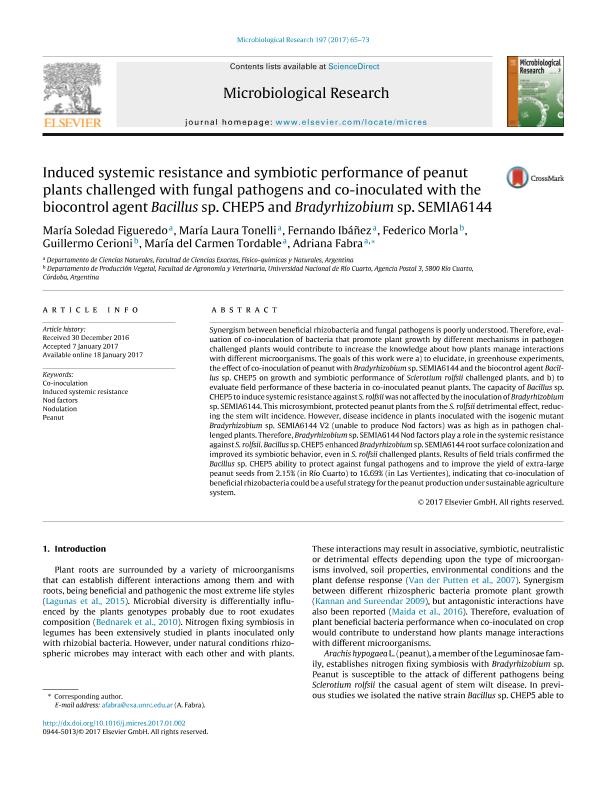Artículo
Induced systemic resistance and symbiotic performance of peanut plants challenged with fungal pathogens and co-inoculated with the biocontrol agent Bacillus sp. CHEP5 and Bradyrhizobium sp. SEMIA6144
Figueredo, María Soledad ; Tonelli, Maria Laura
; Tonelli, Maria Laura ; Ibañez, Fernando Julio
; Ibañez, Fernando Julio ; Morla, FEDERICO DANIEL
; Morla, FEDERICO DANIEL ; Cerioni, Guillermo Angel; del Carmen Tordable, María; Fabra, Adriana Isidora
; Cerioni, Guillermo Angel; del Carmen Tordable, María; Fabra, Adriana Isidora
 ; Tonelli, Maria Laura
; Tonelli, Maria Laura ; Ibañez, Fernando Julio
; Ibañez, Fernando Julio ; Morla, FEDERICO DANIEL
; Morla, FEDERICO DANIEL ; Cerioni, Guillermo Angel; del Carmen Tordable, María; Fabra, Adriana Isidora
; Cerioni, Guillermo Angel; del Carmen Tordable, María; Fabra, Adriana Isidora
Fecha de publicación:
04/2017
Editorial:
Elsevier Gmbh
Revista:
Microbiological Research
ISSN:
0944-5013
Idioma:
Inglés
Tipo de recurso:
Artículo publicado
Clasificación temática:
Resumen
Synergism between beneficial rhizobacteria and fungal pathogens is poorly understood. Therefore, evaluation of co-inoculation of bacteria that promote plant growth by different mechanisms in pathogen challenged plants would contribute to increase the knowledge about how plants manage interactions with different microorganisms. The goals of this work were a) to elucidate, in greenhouse experiments, the effect of co-inoculation of peanut with Bradyrhizobium sp. SEMIA6144 and the biocontrol agent Bacillus sp. CHEP5 on growth and symbiotic performance of Sclerotium rolfsii challenged plants, and b) to evaluate field performance of these bacteria in co-inoculated peanut plants. The capacity of Bacillus sp. CHEP5 to induce systemic resistance against S. rolfsii was not affected by the inoculation of Bradyrhizobium sp. SEMIA6144. This microsymbiont, protected peanut plants from the S. rolfsii detrimental effect, reducing the stem wilt incidence. However, disease incidence in plants inoculated with the isogenic mutant Bradyrhizobium sp. SEMIA6144 V2 (unable to produce Nod factors) was as high as in pathogen challenged plants. Therefore, Bradyrhizobium sp. SEMIA6144 Nod factors play a role in the systemic resistance against S. rolfsii. Bacillus sp. CHEP5 enhanced Bradyrhizobium sp. SEMIA6144 root surface colonization and improved its symbiotic behavior, even in S. rolfsii challenged plants. Results of field trials confirmed the Bacillus sp. CHEP5 ability to protect against fungal pathogens and to improve the yield of extra-large peanut seeds from 2.15% (in Río Cuarto) to 16.69% (in Las Vertientes), indicating that co-inoculation of beneficial rhizobacteria could be a useful strategy for the peanut production under sustainable agriculture system.
Palabras clave:
CO-INOCULATION
,
INDUCED SYSTEMIC RESISTANCE
,
NOD FACTORS
,
NODULATION
,
PEANUT
Archivos asociados
Licencia
Identificadores
Colecciones
Articulos(CCT - CORDOBA)
Articulos de CTRO.CIENTIFICO TECNOL.CONICET - CORDOBA
Articulos de CTRO.CIENTIFICO TECNOL.CONICET - CORDOBA
Citación
Figueredo, María Soledad; Tonelli, Maria Laura; Ibañez, Fernando Julio; Morla, FEDERICO DANIEL; Cerioni, Guillermo Angel; et al.; Induced systemic resistance and symbiotic performance of peanut plants challenged with fungal pathogens and co-inoculated with the biocontrol agent Bacillus sp. CHEP5 and Bradyrhizobium sp. SEMIA6144; Elsevier Gmbh; Microbiological Research; 197; 4-2017; 65-73
Compartir
Altmétricas



